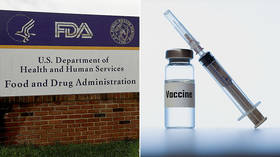Election Day Covid-19 vaccine looks unlikely as FDA rolls out stricter guidelines in the face of declining public confidence

The US Food and Drug Administration has released more stringent safety guidelines for Covid-19 vaccines, overriding White House resistance and making it all but impossible that an approved jab will be available by Election Day.
The agency released tighter standards for emergency coronavirus vaccine approval on Tuesday, almost certainly spoiling President Donald Trump’s plan to have the jab rolled out for the public before Americans head to the polls on November 3. The White House had complained the new guidelines would unacceptably delay the much-anticipated vaccine and attempted to prevent their release for two weeks.
The new recommendations, which are not legally binding, strongly encourage manufacturers to follow patients for at least two months after their last jab in order to monitor any late-appearing adverse effects. They also advocate ensuring the immune response does not wear off rapidly, and potentially observing how inoculated patients respond to virus exposure. With Phase III trials ongoing for four of the vaccine candidates and a fifth set to enter Phase III this month, the recommended monitoring period would push approval into December – even if clinical trials concluded this week and no side-effects cropped up.
Breaking News: The FDA released stricter coronavirus vaccine guidelines that the White House had previously blocked, making it highly unlikely that a vaccine could be authorized before Election Day.https://t.co/JwwVu7tkGH
— The New York Times (@nytimes) October 6, 2020
In addition to the extended monitoring period, manufacturers are advised to document five cases of severe Covid-19 infection in trial participants who received the placebo, ensuring participants’ continued health isn’t merely a product of their belief that they have been vaccinated.
The New York Times speculated that the guidelines had finally been released in response to a marked decline in public confidence in the jab, which many fear will be rushed, unsafe, or ineffective. A whopping two-thirds of Americans polled last month were unwilling to participate in the first round of immunizations, with a quarter saying they’d never get it and 44 percent adopting a “wait and see” approach.
That fraction has grown steadily over the last few months as Republicans and Democrats turned the vaccine into a political football. The FDA itself was accused of taking a political stance by billionaire vaccine evangelist Bill Gates, whose money is bankrolling the development and future manufacture of six vaccine candidates.
Also on rt.com Round up the ‘anti-vaxxers’? Enlist religious leaders? Bill Gates warns US needs to brainstorm ways to reduce ‘vaccine hesitancy’While the guidelines were submitted to the Office of Management and Budget last month, they reportedly languished in the White House chief of staff’s office until the FDA sneaked them into a longer document prepared for an upcoming meeting of the Vaccines and Related Biological Products Advisory Committee, which is responsible for discussing and evaluating vaccine candidates.
The FDA can only issue an emergency use authorization if there is “no adequate, approved, and available alternative to the [vaccine] for diagnosing, preventing, or treating” Covid-19, a requirement that – unlike the agency’s clinical trial guidance – is binding. The vaccine must also be shown to be effective in preventing the disease. Before 2020, no drug manufacturer had ever successfully developed a vaccine against a human coronavirus, with many trials not even making it past the animal stage because vaccination caused a more severe infection – typically called “immune enhancement” but referred to in the FDA guidelines as “vaccine-associated enhanced respiratory disease.”
However, Russia’s Sputnik V jab, which published glowing clinical trial results last month, will be rolled out to the general public in January 2021, and China’s CoronaVac was approved for emergency use in July.
Also on rt.com Putin considers taking Russia's 'Sputnik V' Covid-19 vaccine, as Seoul reveals Russian president is planning trip to South KoreaThink your friends would be interested? Share this story!













